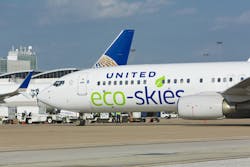The United investment was the single largest of its kind by a United States-based airline in alternative fuels. The Chicago-based airline has been making investments in alternative biofuels since 2009 when United performed its first test flight. The Fulcrum investment is part of United’s Eco-Skies program that, in addition to biofuel development and fuel efficiency, includes carbon offsets, eco-friendly terminals and an expanded recycling program.
“United's Eco-Skies program is our commitment to creating a more sustainable travel experience for our customers throughout their journey,” Angela Foster-Rice, managing director of environmental affairs and sustainability at United, says.
"We know alternative fuels is an emerging industry that is vital to the future of aviation and this is just one of our initiatives to help make these fuels saleable and scalable," Brett Hart, United's executive vice president and general counsel said in the release for United’s investment in Fulcrum. "Investing in alternative fuels is not only good for the environment, it's a smart move for our company as biofuels have the potential to hedge against future oil price volatility and carbon regulations."
In addition to the Fulcrum investment, United has also been purchasing biofuels from AltAir Fuels since 2013. Both companies make sustainable, low-carbon fuels, but from very different processes. AltAir uses non-edible natural oils and agricultural waste to produce fuel through a technology developed by Honeywell’s UOP.
Alternatively, Fulcrum collects trash that would otherwise end up in a landfill – known in the trash business as municipal solid waste (MSW) – and has developed a process to convert it into biofuel. Fulcrum’s trash-based fuel process reduces lifecycle carbon emissions by more than 80 percent compared to petroleum based fuels.
“This diversion reduces methane emissions from landfills that also contribute to climate change,” Foster-Rice says.
The other benefit of Fulcrum’s technology is obviously a nearly unlimited supply – no one has ever doubted our ability as a nation to produce trash.
Still, biofuel production is literally a drop in the barrel compared to petroleum-based production, but to change that airlines and fueling companies need to invest time, energy and, yes, money into alternative power sources. Biofuel production, according to Foster-Rice, is in its infancy and thus supply is small. Pricing, however, is already competitive to traditional aviation fuels and investments like the one in Fulcrum will continue to shape the future of aviation fueling.
Regulating Emissions
As of July 1, the EPA started the process to establish emission standards for aircraft in the United States through the Clean Air Act of 1963. The EPA, in their call for comments, proposes that “greenhouse gas (GHG) emissions from engines used in U.S. subsonic jet aircraft with a maximum takeoff mass (MTOM) greater than 5,700 kilograms (approximately 12,566 pounds) and in subsonic propeller driven (e.g., turboprop) aircraft with a MTOM greater than 8,618 kilograms (approximately 19,000 pounds).”
The EPA has called for comments relating to both an effective date and stringency level for GHG (mostly carbon dioxide) emissions from aircraft, as well as whether or not “international standards should apply to new in-production aircraft as well as new aircraft types.”
While the EPA’s proposed standard hasn’t been announced yet, United claims to have increased their fuel efficiency by 33 percent – a savings equivalent to removing 225,000 cars from the roads – since 1994. At the same time, 21 years is a long time to advance fueling technology by one-third. A new EPA regulation should be considerably more aggressive than 1.5 percent per year.
Implementing Improvements
At the forefront of challenges to most environmentally-motivated changes are the infrastructure investments that stakeholders insist will turn their company from a profitable powerhouse into an immediate money loser.
That well has gone dry – pun intended. The biofuel developed by both Fulcrum and AltAir are drop-in fuels, according to Foster-Rice, and can be stored in the same tanks as traditional jet fuel and burned in the same engines as traditional jet fuel.
“Our biofuel will meet the same stringent international fuel certification as conventional jet fuel and the FAA has approved it for use,” Foster-Rice says. “It is molecularly identical to traditional jet fuel.”
Not all measures require new technologies, however. Flight crews can take measure including single engine taxiing, continuous descent approaches and flying polar routes, according to Foster-Rice. “Beyond that, we continue to look for new ways to reduce our emissions through fuel efficiency and reduced consumption,” she says.
While United’s ground support “greenification” lags behind their jet engine efforts, Foster-Rice says the company plans to move their GSE to electric power over time, and the process has already started. In some instances, she says, United may attempt to move GSE onto fuels made from MSW like those produced by Fulcrum.
“We’ll be adding new units at some airports in our network as well as evaluating opportunities to introduce renewable diesel into our operations,” she says.
United won the Global Business Travel Association Foundation’s Sustainability Outstanding Achievement Award and the ICARUS Gold Award for Sustainability Excellence in 2014. IN addition to receiving awards, United lunched the Eco-Skies Community Grant Program in 2012 to promote sustainability-based projects across the country.
In 2013, we were recognized for our environmental accomplishments and named Air Transport World magazine's Eco-Aviation "Airline of the Year" Gold Winner, and in 2014, we received the Global Business Travel Association Foundation's Sustainability Outstanding Achievement Award as well as the ICARUS Gold Award for Sustainability Excellence.
“As a part of our commitment to environmental responsibility, we want to continue to champion those dedicated to advancing the research in alternative fuels for aviation and encourage those organizations to work to commercialize the industry,” Foster-Rice says. “United Eco-Skies has supported the Clean Energy Trust and the Clean Energy Challenge for the last three years because of their work to fund and mentor start-up businesses working on clean energy technology.”






